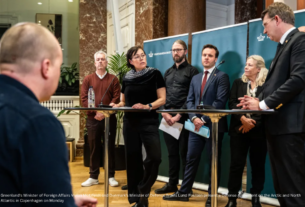The European Union will allocate €60 million to Moldova’s defense sector in 2025 to help strengthen its security against external threats. The announcement comes as Moldova faces increasing pressure from Russia, which has sought to destabilize the country through political influence and energy disruptions. The aid package will be used to modernize Moldova’s military, enhance cybersecurity, and improve border security.
Moldova has warned that Russian interference threatens its stability, especially with ongoing tensions in neighboring Ukraine. The EU sees Moldova as a key partner in its efforts to counter Russian aggression in Eastern Europe. The funding is part of a broader strategy to support countries vulnerable to Moscow’s influence.
“Moldova must be prepared for any security challenge,” a government official said. The country has taken steps to strengthen its military capabilities. Moldova’s defense budget has been increased, with a focus on upgrading equipment and training forces. The EU’s financial support will accelerate these efforts, ensuring Moldova can respond to potential threats.
Cybersecurity is a major concern. Moldova has experienced cyberattacks targeting government institutions and infrastructure. Officials have blamed Russian-linked groups for attempting to disrupt communications and influence public opinion. The EU’s aid package includes funding for cybersecurity improvements to protect sensitive data and critical systems.
Border security is another priority. Moldova shares a border with Ukraine, where the war has created instability. Smuggling networks and illegal crossings have increased, raising concerns about regional security. The EU’s funding will help Moldova strengthen border control measures and prevent potential threats from spreading.
“Moldova’s security is linked to Europe’s stability,” an EU representative stated. European officials have emphasized the need to protect Moldova from external interference. The EU has expanded its cooperation with Moldova, including intelligence-sharing and joint security initiatives. NATO has also increased its engagement, providing training and logistical support.
Moldova has moved closer to the EU in recent years. The government has pursued democratic reforms and economic integration with Europe. Moldova was granted EU candidate status in 2022, signaling its commitment to joining the bloc. Russian officials have opposed Moldova’s European ambitions, viewing them as a threat to Moscow’s influence.
Russia has used economic pressure to weaken Moldova’s government. Energy supplies have been restricted, forcing Moldova to seek alternatives. The EU has helped Moldova secure energy resources, reducing its dependence on Russian gas. Economic support has also been provided to stabilize Moldova’s financial situation.
Pro-Russian political groups continue to challenge Moldova’s leadership. Protests have been organized to demand closer ties with Moscow. Disinformation campaigns have spread false narratives about the government’s policies. Authorities have responded by tightening regulations on foreign-funded political activities.
The EU’s assistance is part of a wider effort to support Eastern European countries. Ukraine, Georgia, and the Baltic states have also received financial and military aid. European leaders believe strengthening Moldova’s security will contribute to regional stability. The funding agreement reflects the EU’s long-term commitment to supporting its allies.
Moldova’s government remains focused on defending its sovereignty. Security reforms are being implemented to modernize the country’s institutions. The EU’s aid package will provide crucial resources to strengthen Moldova’s defense capabilities. The outcome of these efforts will shape Moldova’s future in Europe.




